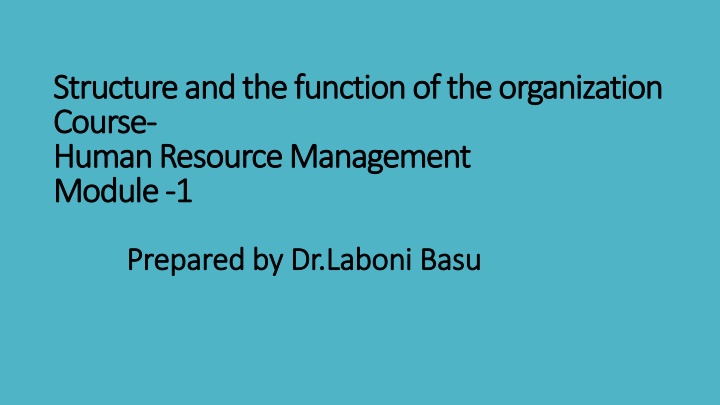
HR Department Structure and Functions in Organizations
Explore the hierarchical structure of HR departments in organizations, including key roles like HR Manager, Business Partners, and Specialists. Learn about the essential functions carried out in HR Management, such as recruitment, training, compensation, and legal compliance, to ensure effective human resource practices.
Download Presentation

Please find below an Image/Link to download the presentation.
The content on the website is provided AS IS for your information and personal use only. It may not be sold, licensed, or shared on other websites without obtaining consent from the author. If you encounter any issues during the download, it is possible that the publisher has removed the file from their server.
You are allowed to download the files provided on this website for personal or commercial use, subject to the condition that they are used lawfully. All files are the property of their respective owners.
The content on the website is provided AS IS for your information and personal use only. It may not be sold, licensed, or shared on other websites without obtaining consent from the author.
E N D
Presentation Transcript
Structure and the function of the organization Structure and the function of the organization Course Course- - Human Resource Management Human Resource Management Module Module - -1 1 Prepared by Prepared by Dr.Laboni Dr.Laboni Basu Basu
HR departments have a hierarchical structure that consists of various levels such as: HR Manager/Chief HR Officer HR Business Partners/Managers HR Specialists
Functions carried out in an organization in Human Resource Management include: Recruitment and Selection Training and Development Compensation and Benefits Performance Management Employee Relations HRIS (Human Resource Information Systems Compliance and Legal Organizational Development
HR departments have a hierarchical structure that consists of various levels such as: 1. HR Manager/Chief HR Officer: The head of the HR department who is responsible for setting the overall strategic direction and policies related to human resources. 2. HR Business Partners/Managers: These individuals work closely with the various business units within the organization to align HR policies and practices with the strategic goals of the organization. 3. HR Specialists: These professionals are responsible for specific HR functions such as recruitment, training and development, compensation and benefits, employee relations, and HRIS (Human Resource Information Systems).
Functions carried out in an organization in Human Resource Management include: Recruitment and Selection Training and Development Compensation and Benefits Performance Management Employee Relations HRIS (Human Resource Information Systems): Compliance and Legal
Functions carried out in an organization in Human Resource Management include: Recruitment and Selection: The HR department is responsible for attracting, sourcing, and selecting the right talent for the organization. This includes creating job descriptions, conducting interviews, and making job offers. Training and Development: HR is responsible for identifying training needs, designing training programs, and implementing development initiatives to enhance the skills and competencies of employees. Compensation and Benefits: The HR department manages employee compensation, including salaries, bonuses, and benefits such as healthcare, retirement plans, and other perks.
Functions carried out in an organization in Human Resource Management include: Performance Management: HR sets performance goals, evaluates employee performance, and provides feedback to improve employee productivity and engagement. Employee Relations: HR manages relationships between employees and the organization, handles grievances, and ensures a positive work environment. HRIS (Human Resource Information Systems): These systems are used by HR to manage employee data, track attendance, and manage payroll and benefits.
Functions carried out in an organization in Human Resource Management include: Compliance and Legal: HR ensures that the organization complies with labor laws, regulations, and ethical standards in all HR practices. Organizational Development: HR plays a key role in managing change within the organization, improving communication, and fostering a positive organizational culture.
Conclusion and overview Conclusion and overview Overall, the HR department is responsible for supporting the organization's strategic goals by managing its most important asset - its people.






















